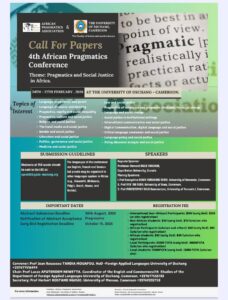
Theme: Pragmatics and Social Justice in Africa
Conference Overview
 Pragmatics, the study of language in the context of use and users, has developed significantly over the years with an excellent feat in dealing with context-dependent and context-shaping communication across several domains thanks to the influences of its theories. While the West had a thankfully and domineeringly pioneering role in creating and nurturing the theoretic trajectories of pragmatics, Africa, in recent times, has also contributed to the pool. Thus, theories and models such as the speech act theory (Wittgenstein, 1953; Austin 1962; Searle 1969, 1983; Bach and Harnish 1969, 1979); intention-based theories (Grice 1975, Sperber and
Pragmatics, the study of language in the context of use and users, has developed significantly over the years with an excellent feat in dealing with context-dependent and context-shaping communication across several domains thanks to the influences of its theories. While the West had a thankfully and domineeringly pioneering role in creating and nurturing the theoretic trajectories of pragmatics, Africa, in recent times, has also contributed to the pool. Thus, theories and models such as the speech act theory (Wittgenstein, 1953; Austin 1962; Searle 1969, 1983; Bach and Harnish 1969, 1979); intention-based theories (Grice 1975, Sperber and
Wilson 1995); the pragmatic act theory; face, politeness and impoliteness theories (Lakoff 1974; Brown and Levinson 1987, Culpeper 2008; Culpeper and Hardaker 2017); interlanguage pragmatics (Kasper and Blum-Kulka 1993); variational pragmatics (Barron & Schneider, 2008, 2009); intercultural Pragmatics (Kecskes 2014); the complicity model (Verschueren 2022) and sundry other interventions are currently being complemented with African-developed models such as the contextual beliefs model (Odebunmi 2006); postcolonial pragmatics (Anchimbe and Janney 2011); emancipatory pragmatics (Ameka and Terkourafi 2019) and cognition pragmatics (Odebunmi 2024).
This huge theoretic arsenal of pragmatics has recently been shown to possess the ability not only to describe how language works in context and how intentions and agendas are constructed or co-constructed but also how pragmatic analysis is used to address pressing social issues. It is within this intersection that this 4th conference of the African Pragmatics Association (APrA) has captured the question of social justice in Africa.
Social justice has often been based on five principles: equal access to economic, social and political resources; diversity; equity; participation and human rights. These principles are also partly reflected in the United Nations Universal Declaration of Human Rights (UDHR): “recognition of the inherent dignity and of the equal and inalienable rights of all members of the human family is the foundation of freedom, justice and peace in the world …” and in the words of Professor Thuli Madonsela at the Social Justice Summit and International Conference in Stellenbosch, 29 and 31 August, 2019: “As long as there is injustice somewhere, there can’t be sustainable peace anywhere.”
Although social justice is still a desire in most global communities, it is a more serious concern in Africa where multiple social, economic and political obstacles wrapped in ideological realities undermine the right for social justice. Thus, a pragmatic approach, with a multidisciplinary dimension, enhances the understanding of social justice, and its interfaces with issues of identities, ethnicity, sociality, culture, ecology and power dynamics.
This 4th conference of the African Pragmatics Association seeks to foster interdisciplinary dialogue and critical thinking on the intricate and multidimensional relationship between pragmatics and social justice in Africa.
It invites submissions which address the sub-themes below (and more in related areas) contextualised in the social justice question in Africa, and grounded in pragmatic theories:
Submissions on any pragmatically-relevant topics are also welcome.
Abstracts, including panel proposals, which should be between 200 and 300 words long, should be sent to the LOC at: [email protected]
The languages of the conference are English and French, but panels may be organised in other languages spoken in Africa (e.g., Kiswahili, Afrikaans, isiZulu, isiXhosa, Hausa, Arabic, Pidgin, Portuguese, Dutch, German,).
Keynote Speaker:
Professor Bernard MULO FARENKIA, Cape Breton University, Canada Plenary Speakers:
1.Prof Evangeline AGWA FOMUKONG SEINO, University of Bamenda, Cameroon
Important Dates
Registration Fees
-African students: $30 (early bird), $40 (late/on-site registration)
Bank account details:
Faculty of Letters and Social Sciences, University of Dschang,
Account Number: 10008-0004237142002004-41
Bank: FLSH-UD, Commercial Bank of Cameroon
For more information, please visit: https://africaprag.org/ or contact: [email protected]
Local Organising Committee
Convener: Prof Jean Rousseau TANDIA MOUAFOU, HoD of the Department of Foreign Applied Languages University of Dschang
Chair: Prof Lucas AFUTENDEM NKWETTA, Coordinator of the English and Commonwealth Studies of the Department of Foreign Applied Languages University of Dschang, Cameroon.
Secretary: Prof Herbert ROSTAND NGOUO, University of Maroua, Cameroon
For further enquiries, contact the following: President, African Pragmatics Association:
Akin Odebunmi, University of Ibadan, Nigeria
([email protected]/[email protected])
Secretary, African Pragmatics Association:
Helga Schroeder, Africa International University, Nairobi, Kenya
([email protected]/[email protected])